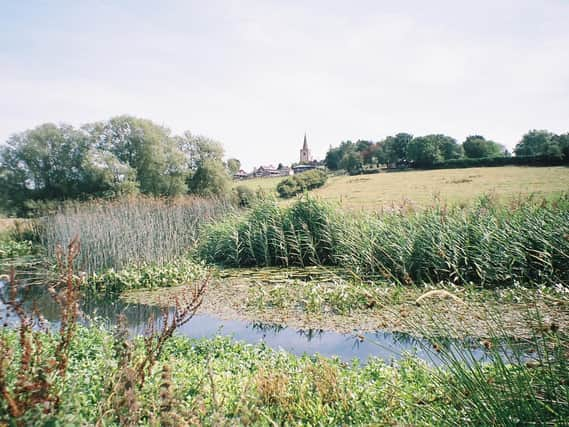The Great Freeze of 1962-63 - pipes froze solid and masses of birds perished but Lawrence Sheriff stayed open


The snows arrived and then the frost, sealing the icy prison that had entombed the land.
Then came more of the white stuff… and when darkness fell, the day’s further snowfalls again froze solid.
Advertisement
Hide AdAdvertisement
Hide AdA pattern was developing that soon had the entire country locked in its icy grip. When would this ever end?
There must still be many Rugby people around who will remember the Great Freeze of 1962-63 when they endured three months of Arctic temperatures, the like of which had not been seen for years.
It was perfectly true that there had been a kind of rehearsal back in 1947 when freak weather paralysed much of Britain, a country that was still recovering from the effects of the Second World War.
But the Great Freeze of this winter was truly something else. The first snow arrived on Boxing Day, 1962, and would not finally vanish from the landscape until March of the following year.
Advertisement
Hide AdAdvertisement
Hide AdAt first, people took it in their stride. After all, this was winter. And it tended to snow in winter, didn’t it? But the difference this time was that there were no thaws, no low pressure systems to melt away the successive layers that gradually entirely covered roads and houses.
As a youngster living in Churchover, my friends and I thought it was all jolly good fun. Endless sledging sessions in the field at the back of Mackaness’s farm, skating on the River Swift, building tunnels along submerged hedgerow ditches and creating ‘snow houses’… there seemed no end to the amount of enjoyment that was presently causing so much trouble for the adults.
And there were soon some very real problems to face. By the middle of January, half of Churchover had no water as the pipes froze solid. Our supply soon stopped, so my sister and I had to carry buckets of the precious wet stuff from a house over the road where, as luck would have it, the water was still on tap.
I would not have a proper wash for weeks. Because the water was obviously rationed, the ‘stand-up bath’ came into being, whereby you rubbed yourself down as best you could.
Advertisement
Hide AdAdvertisement
Hide AdHow would people cope with that today in a world where everyone seems to feel cheated if they don’t have their daily shower?
And then there was the food supply. Luckily, everyone in Churchover in those days grew their own vegetables. Back gardens now covered in artificial turf, decking, patios and swimming pools were once growing plots, providing vital food.
The simple fact was that people had to back then, for there were hardly any supermarkets. And besides, the snow drifts meant you’d never get to them even if they did exist. Many of the roads would remain blocked for weeks.
Yet unlike today, the schools remained open. Children walked to their classes, sometimes over quite long distances. I don’t ever remember missing a day’s schooling at Lawrence Sheriff.
Advertisement
Hide AdAdvertisement
Hide AdAnd anyway, who would want to, when every break time witnessed the glorious fun of a snowball battle on the Whitehall Road playing field, vast armies of blue-blazered soldiers engaged in mortal combat, and the air thick with rounded, white missiles?
There were no petty health and safety rules then. It was a society that lived with risk and was quite happy to do so,
But the real losers in all of this were Rugby’s wildlife. It’s estimated that half of Britain’s birds died during the Great Freeze, with 90 per cent of some small species – such as wrens – perishing in the cold.
I can remember seeing skeletal partridges and pheasants, too weak to flee when humans came near. Rabbits and hares came into our garden to feast on brussels sprouts and cabbages, while they in turn were pursued by ravenous foxes, also having completely lost their natural fear of Man.
Advertisement
Hide AdAdvertisement
Hide AdStarlings froze to death on telegraph wires and water birds such as herons, moorhens and ducks died in their thousands.
I recall finding a perfectly preserved kingfisher, frozen rock solid. In my naivety, I took the dead bird home, hoping to preserve it in some way. Of course, after a few days it started to decay and smell… and that was that.
My mother said it would have to go.
Around the middle of March, our water came on again, the banging pipes and spluttering taps announcing its return. The Great Freeze was over, to
be followed by the Great Thaw.
The Swift and Avon finally broke free from their icy straitjackets, and soon burst their banks as they ran high and muddy with floodwater, turning the outlying water meadows into vast lakes which once again providing entertainment for small boys as they descended clutching model boats and yachts.
Advertisement
Hide AdAdvertisement
Hide AdFreedom at last. It was true that it had been an ordeal for both man and beast, yet if the Great Freeze proved one thing, it was this… that once again, it was possible for humankind to overcome all manner of adversity, whether in the form of conflict, bad weather… or deadly virus.
John Phillpott’s book Beef Cubes and Burdock: Memories of a 1950s Country Childhood can be ordered from booksellers or on the internet.